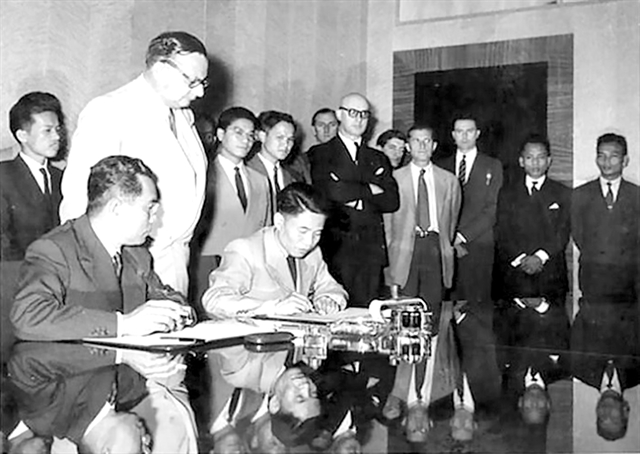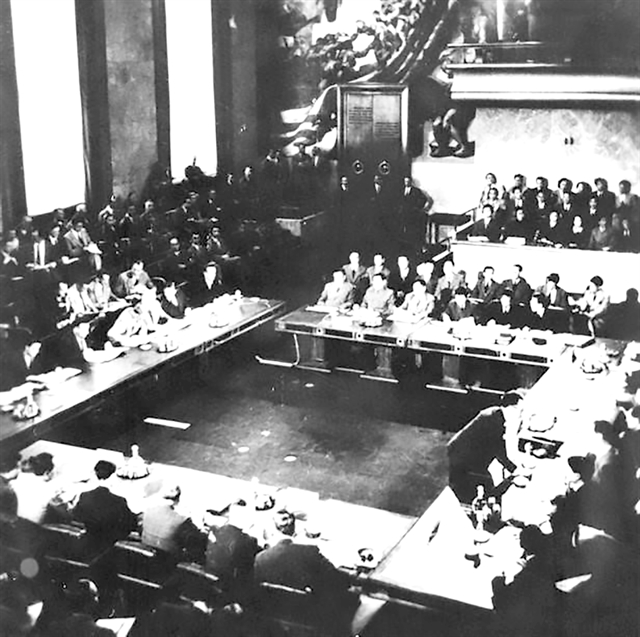 |
| Deputy Minister of National Defence Tạ Quang Bửu (sitting, right), of the delegation of the Democratic Republic of Việt Nam, and French General Henri Delteil, Acting Commander-in-chief of the French Union forces in Indochina, sign the agreement on the cessation of hostilities in Việt Nam. — VNA/VNS File Photo |
HÀ NỘI — Seventy years ago, the Geneva Agreement on the Cessation of Hostilities in Việt Nam was signed, opening up a new chapter in the country’s struggle for national liberation and reunification.
Along with the 1946 Preliminary Agreement and the 1973 Paris Agreement, the 1954 Geneva Agreement was a glorious milestone in Việt Nam's revolutionary diplomacy, bearing the imprint of President Hồ Chí Minh’s ideology, style and art of diplomacy. It was also a vivid demonstration of the country’s “bamboo diplomacy”, as recognised by international experts.
Việt Nam on its way from Điện Biên Phủ to Geneva
In late 1953, amid tremendous shifts in the Indochinese battlefield, the Communist Party of Việt Nam and President Hồ Chí Minh decided to wage a battle on the diplomatic front in conjunction with the 1953-1954 Winter-Spring Offensive to put an end to the war and restore peace in Việt Nam and the entire Indochina.
On May 8, 1954, one day after the Điện Biên Phủ victory that “echoed across five continents and shook the entire world”, the Geneva Conference began to discuss the restoration of peace in Indochina.
After 75 days of complicated and intense negotiations with 31 sessions, the Geneva Agreements was signed on July 21, 1954. This, coupled with the Final Declaration on Restoring Peace in Indochina, affirmed the independence, sovereignty, unity and territorial integrity of Việt Nam, prevented the deployment of military officers and personnel to Việt Nam, and determined the temporary nature of military borders as well as the need for an eventual free general election, among others.
In a rally following the successful Geneva Conference on July 22, 1954, President Hồ Chí Minh announced that: “The Geneva Conference has concluded, and Việt Nam's diplomacy has achieved a great victory.”
Indeed, while France only recognised Việt Nam as a free state within the French Union in the 1946 Preliminary Agreement, with the Geneva Agreement, for the first time in the history of our country, Việt Nam's fundamental rights of a nation, including independence, sovereignty, unity and territorial integrity, were officially affirmed in an international treaty, and recognised by countries at the Geneva Conference. This constituted an important political and legal basis for our people to continue the fight on political and diplomatic fronts, so as to subsequently liberate the South and reunite the country.
Together with the Điện Biên Phủ victory, the signing of the Geneva Agreement led to the successful conclusion of the Vietnamese people’s resistance war against the French colonial empire, and put a decisive end to the reign of colonialism over Việt Nam for nearly 100 years.
According to history books, the Agreement had paved the way for a new strategic phase for Việt Nam's revolution - the building of socialism in the North, and the pursuit of national and people’s democratic revolution in the South, with a view to truly achieving national independence and reunification.
Flexible yet resolute tactics key to Việt Nam's negotiation success
In a recent talk with the Vietnam News Agency, Major General Phạm Sơn Dương, the only son of late Prime Minister Phạm Văn Đồng who headed the delegation of the Government of the Democratic Republic of Việt Nam to the Geneva conference, recalled what his father had told him about that memorable day.
“My father said the atmosphere at that conference was very tense but he remained totally composed, adhered to principles and was also ready to switch to flexible tactics if necessary in order to best protect national interests as he remembered vividly Uncle Hồ’s advice for him right before the negotiations,” Major General Dương recollected.
“The ultimate goal, Uncle Hồ told my father, was to force the French to recognise the independence, sovereignty, and territorial integrity of Việt Nam, Laos, and Cambodia.”
According to Major General Dương, his father walked into the Geneva Conference with utmost confidence as he was already armed with warfare analyses and preparations of response plans to cope with possible interventions of major powers, all of which Uncle Hồ and his father had thoroughly discussed.
At the Geneva conference, Phạm Văn Đồng presented the eight-point stance requesting France to recognise Việt Nam's sovereignty and independence across its territory, along with sovereignty and independence of Laos and Cambodia.
The Geneva Agreement resolved the Indochina issue in accordance with the stance of the Democratic Republic of Việt Nam, that was establishing peace on the basis of respect for the right of national unity, independence, and democracy of the three countries in the region.
 |
| The opening ceremony of the Geneva conference. — VNA/VNS File Photo |
Commenting on Việt Nam's tactics in signing the Geneva Agreement, Pierre Asselin, Professor of History at San Diego State University, the US, said: “In signing the Geneva Agreement, President Hồ Chí Minh hoped for the best but also prepared for the worst.
“Phạm Văn Đồng and other negotiators of the Democratic Republic of Việt Nam faced many challenges. I think that Vietnamese diplomacy was quite shrewd and sensible in Geneva. In the final analysis, they worked and availed themselves well.”
Việt Nam carried forward the spirit of independence and self-reliance during the negotiations, persistently pursued strategic goals and knew how to make principled concessions to ensure national interests, according to Professor Asselin.
This spirit was clearly stated by President Hồ Chí Minh in his interview with Expressen newspaper of Sweden on November 26, 1953.
“If France continues the war, the Vietnamese people are determined to carry on their patriotic war until the final victory. But if the French Government has learnt a lesson from this years-long war, and wishes to cease hostilities in Việt Nam through negotiations and settle the Việt Nam issue in a peaceful manner, then the people and Government of the Democratic Republic of Việt Nam stand ready to welcome such intention” and “the foundation for the cessation of hostilities in Việt Nam is the French Government’s sincere respect for Việt Nam's true independence.”
Talking to Vietnam News Agency on the occasion of 70-year anniversary of Geneva Agreement, Emeritus Professor Carl Thayer from New South Wales University, Australia, said: “Bamboo diplomacy was illustrated through the negotiations of the Geneva Agreement. The Vietnamese negotiators stayed steadfast on their goals of independence and freedom but flexible about how to achieve them.
“Understanding the views and strategic intentions of major powers, Việt Nam handled the situation flexibly through both bilateral and multilateral meetings and exchanges during the negotiations.”
In his recent address looking back on Việt Nam's diplomacy throughout the years, Foreign Minister Bùi Thanh Sơn emphasised that the signing of the Geneva Agreement, together with the Điện Biên Phủ victory, led to the successful conclusion of the Vietnamese people’s resistance war against the French colonial empire, and put a decisive end to the reign of colonialism over Việt Nam for nearly 100 years.
The Agreement had paved the way for a new strategic phase for Việt Nam's revolution - the building of socialism in the North, and the pursuit of national and people’s democratic revolution in the South, with a view to truly achieving national independence and reunification.
The triumphs of the Điện Biên Phủ campaign and the Geneva Agreement also served as a source of encouragement for oppressed nations around the world to rise up and fight for their independence and freedom. Subsequently, numerous countries in Asia, Africa, and Latin America gained independence in various forms, and the movements for peace, national independence, democracy and social progress developed more intensively and extensively.
Notably, between 1954 and 1964, up to 17 African countries gained independence, and by 1967, France was forced to grant independence to most of its former colonies. — VNS